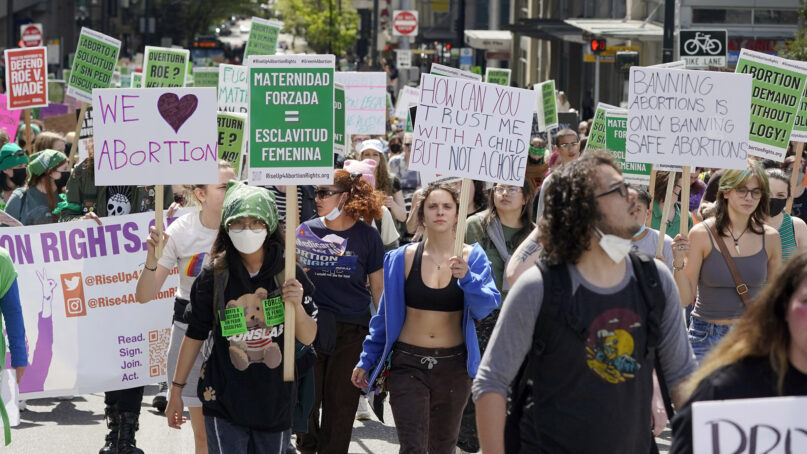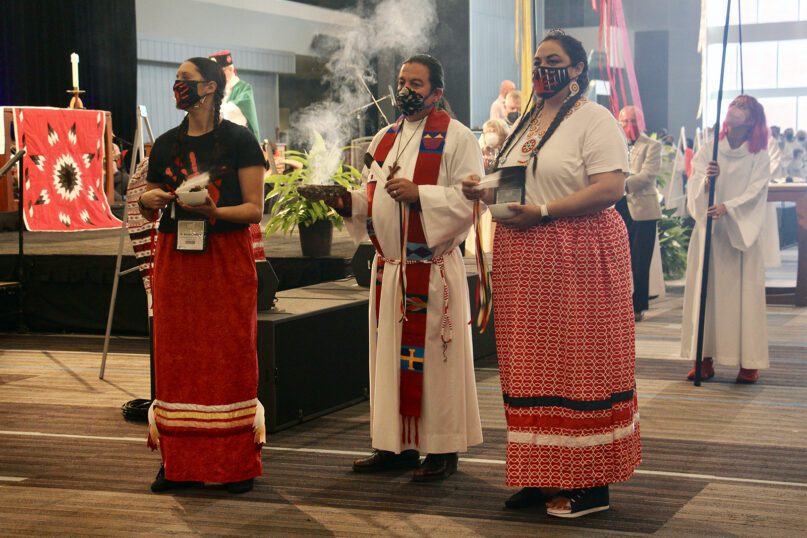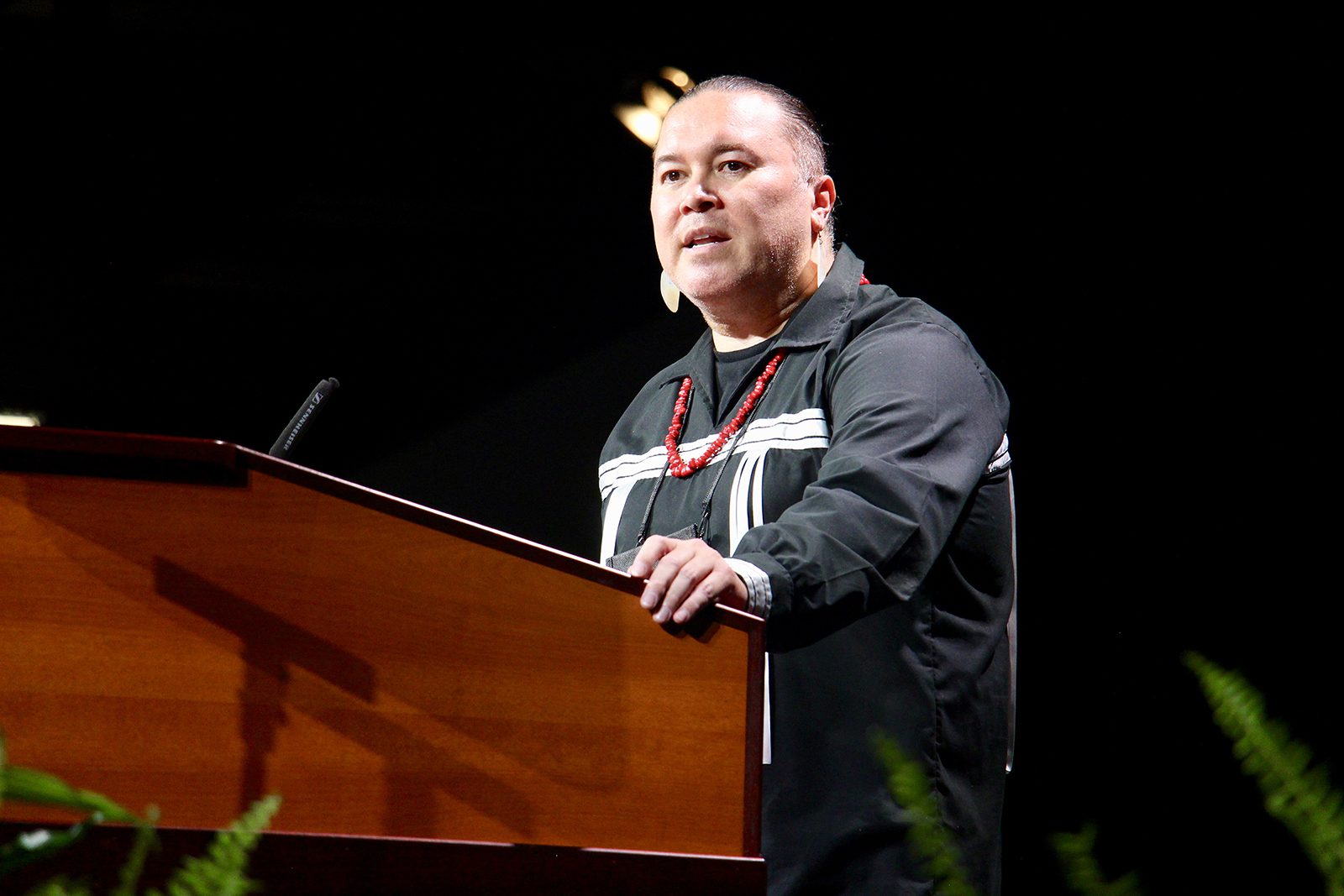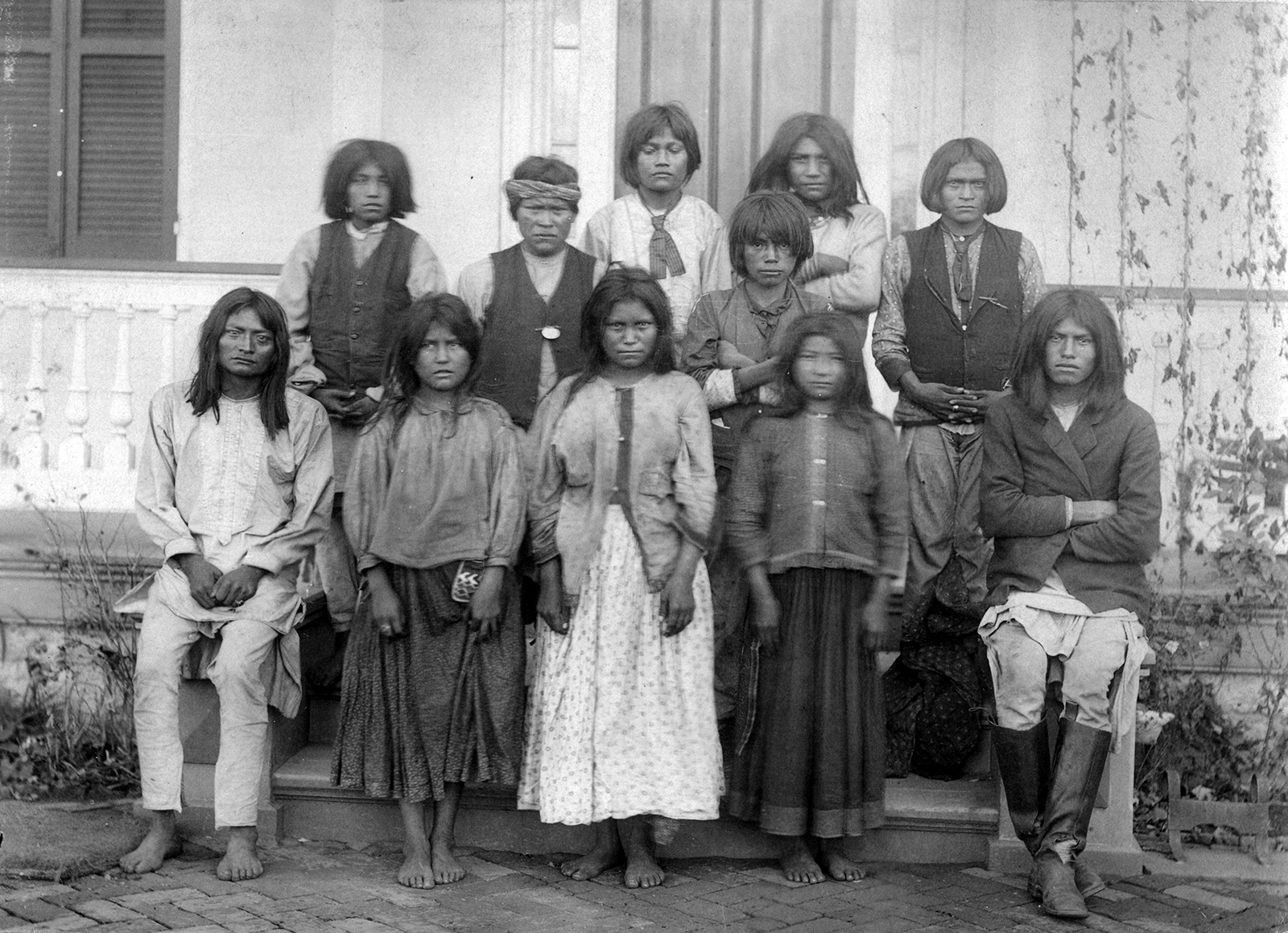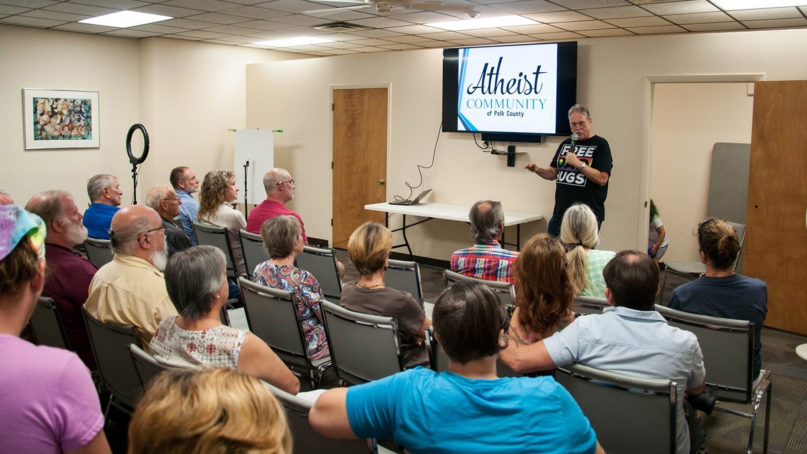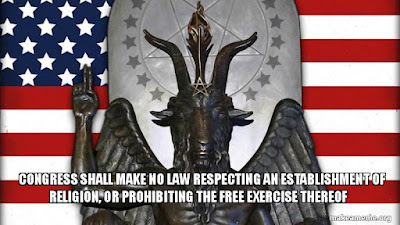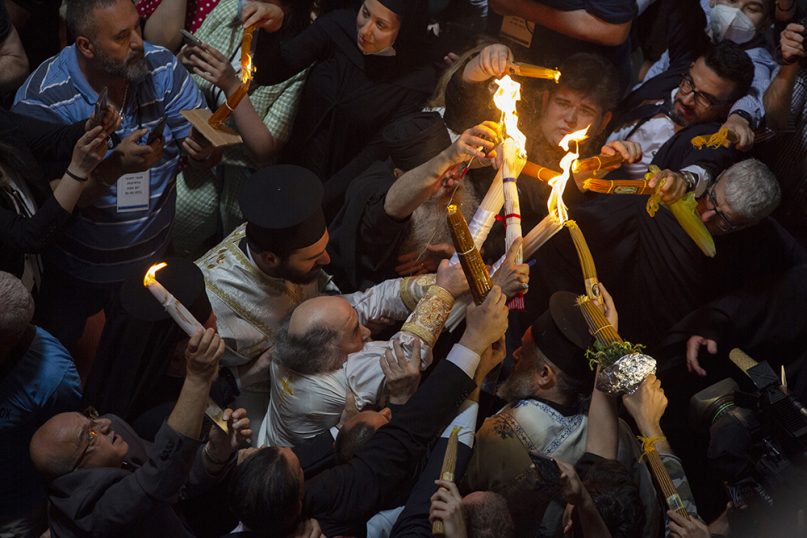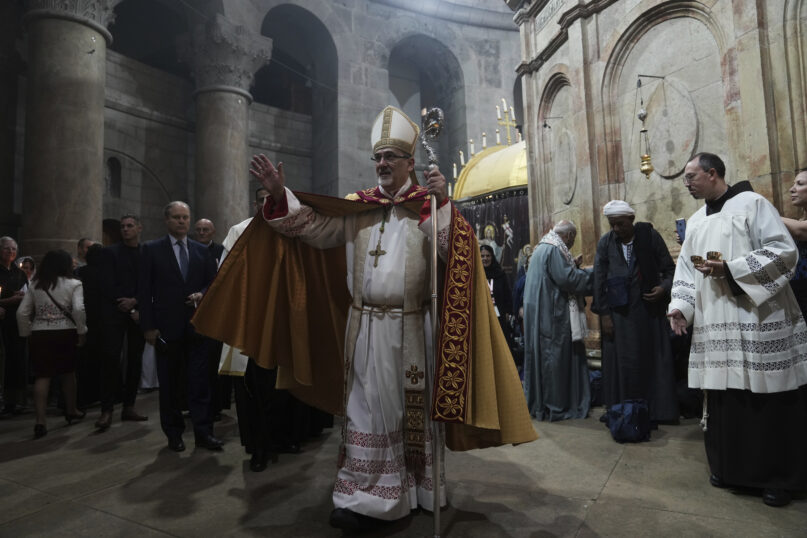(RNS) — Six years ago this month, when Arizona State Representative Athena Salman, an atheist, delivered the invocation to open the day’s legislative session, it started an odd culture war, with faith leaders on one side supporting her and Republican lawmakers rebuking the Tempe Democrat for failing to appeal to a higher power.
Instead, Salman invoked humanity. “Remember the humanity that resides within each and every person here,” she said, “and each and every person in the city, and in all people in the nation and world as a whole.” Her prayer was found to have violated House rules.
Christians and Muslims were part of an interfaith group of clergy who stood in solidarity with Salman at a “Standing for Our First Freedom” gathering at the Arizona State Capitol as they read aloud Salman’s invocation.
Looking back on those events, Evan Clark, an atheist and humanist who helped organize the demonstration, said it was an example of how interfaith networks can “stand with our community when a small or large attack happens.”
Now Clark, the executive director for Los Angeles-based Atheists United, is among a handful of secular groups challenging interfaith organizations that include people of different religious and spiritual backgrounds to make space for those who espouse no faith at all, including atheist and secular networks.
RELATED: Athena Salman, atheist legislator, on secular values and godless invocations
“I’ve never found an interfaith group who wants to exist to just talk about faith,” said Clark, adding that interfaith spaces exist “to get a diverse, pluralistic group of people working together to make change in their community or society.”
In the U.S. and across the globe, interfaith leaders have denounced the violence of Russia’s invasion of Ukraine, advocated against President Joe Biden’s plans to restrict asylum, organized to elect “gun sense” candidates and held vigils and rallies advocating for racial justice.
To leave out the secular community from these efforts, Clark said, “is to discriminate against the largest and fastest growing religious demographic in the United States today.”
Since 2009, the number of Americans identifying as atheist has doubled, from 2% to 4%, and the number of agnostics rose from 3% to 5%, according to Pew Research.
In 2020, American Atheists — a national civil rights organization that seeks to achieve religious equality for all Americans — published its own findings about the community and showed that “nonreligious young people are the fastest growing segment of the nonreligious community.” Their claim to attract American youth tracks with Pew findings that the average nonbeliever is 34 years old.
RELATED: Atheists, spurred by growing ranks, gather for first time since start of pandemic
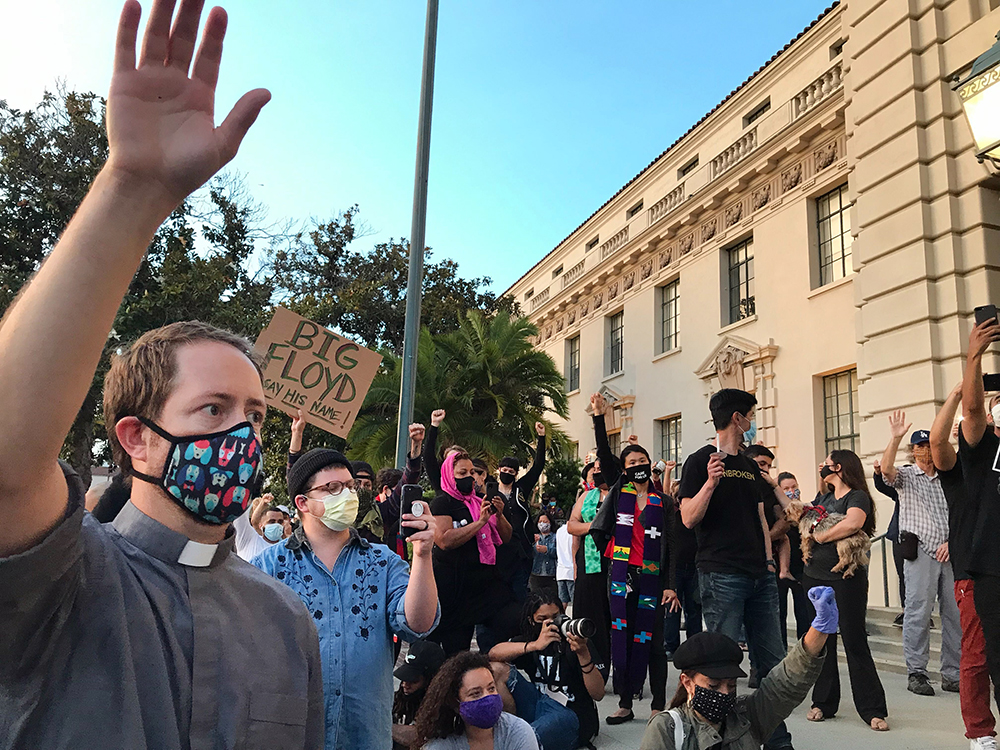
The Rev. Zachary Hoover, left, is with LA Voice, a multiracial and multifaith organization that planned the May 31, 2020, evening vigil in remembrance of George Floyd in Los Angeles. RNS photo by Alejandra Molina
The American Atheist report found that nonreligious people care about maintaining secular public schools, oppose religious exemptions that allow for discrimination, believe in access to abortion and contraception and support protecting the environment and addressing climate change, among other things. But when it comes to advocating for their positions, they are often stigmatized.
When atheist and secular groups held their first meeting with Biden White House officials two years ago, Melissa Rogers, executive director of the White House Office of Faith-Based and Neighborhood Partnerships, welcomed the opportunity to cooperate with nonreligious groups along with faith organizations.
Some religious activists, such as Bill Donohue, president of the Catholic League for Religious and Civil Rights, found the meeting problematic, saying that if the Biden administration was “going to manipulate the founding purpose of faith-based initiatives by welcoming the advice of militant secularists, it would do us all a favor and simply trash this office.”
But secular leaders say fears about including nonreligious individuals is the result of misinformation and misunderstanding.
RELATED: New report finds nonreligious people face stigma and discrimination
On April 4, Clark joined Sarah Levin, founder of Secular Strategies; Debbie Goddard, who serves as vice president of programs for American Atheists; and Vanessa Gomez Brake, a humanist chaplain and associate dean of religious life for the University of Southern California, for an online discussion about the challenges that occur when secular people engage in interfaith work.
“Having ‘Faith’ in Reason: Being Secular in the Interfaith Movement,” was a collaboration with Atheists United and the United Religions Initiative of North America “to promote stronger alliances for the work of peace, justice, and healing.”
The discussion highlighted suggestions on how organizers could be more inclusive in interfaith spaces, which included, building relationships with secular leaders, avoiding prayer or including a secular ritual, sharing the stage, and challenging religious privilege.
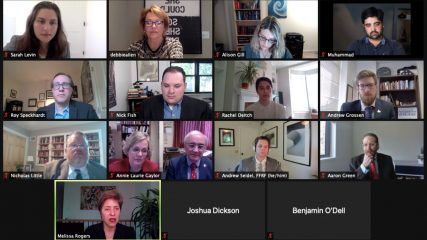
Melissa Rogers, bottom left, executive director of the White House Office of Faith-Based and Neighborhood Partnerships, speaks during a meeting with atheist and secular groups, Friday, May 14, 2021. Video screengrab
Tahil Sharma, with the United Religions Initiative of North America, said it is perplexing to see interfaith leaders refer to the religious freedom movement as “radically inclusive” while “one of the biggest sections of society” is left out of the conversation.
“A lot of communities are behaving as if interfaith cooperation is the goal of society, when in reality, the goal of society should be justice and equity, and the lens at which we do everything is interfaith cooperation,” said Sharma, who is Sikh and Hindu.
Sharma, an interfaith activist in Southern California, said of the more than 50 people who registered for the Having ‘Faith’ event, about half were people of faith. He saw the event as a bridge for people of faith and those who are secular, helping them to realize that “it’s very possible for us to work together.”
Levin noted the importance of dispelling the stereotype that secularists’ aim was to eliminate religion. While a loud minority of the community is anti-theist, Levin said, “most people we work with are not interested in ‘deconverting people.’”
“We have a moral base. Atheists and humanists, secular people, think a lot about what we believe in. That absence of a higher power … leads us to think a lot about it,” Levin said. “People who believe that there’s only one life, and one world, are really motivated to make this one life count and to be good stewards of this one planet that we have.
“We have a lot in common around values and making the world a better place,” she added.
Gomez Brake has seen atheist, agnostic and humanist students lead efforts to have dialogue about religion with other religious students and organizations. “It was in service of greater understanding between the two,” she said.
Because organized religion comes with institutions, networks and buildings, Gomez Brake added, it makes sense for atheist communities to partner with groups with established resources to put “values into action.”
“You can easily pop in to the food bank at the church and lend a helping hand because it’s already an existing program in your neighborhood,” she said.
Gomez Brake said it’s a move “just to be in community with folks who want to do good in the world, irrespective of whether they share the same beliefs.”
Adelle M. Banks and Heather Greene contributed to this report.
 |
| BUDDHIMISM IS ALSO A FORM OF ATHEISM |
